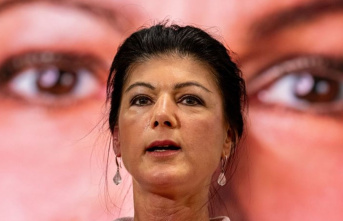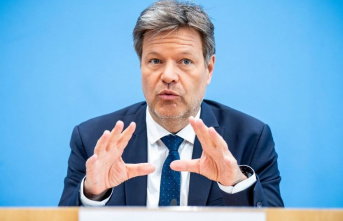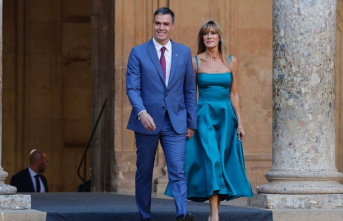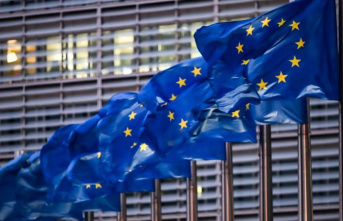So what's left to hold onto? Four weeks have passed since Donald Trump staked his claim to the Republican presidential nomination - and so far he is himself his biggest opponent, possibly his most dangerous.
From the announcement of his candidacy in Mar-a-Lago, which was nothing more than a blunt rewind of well-known positions, to the joint dinner with two fallen conspiracy ideologues, the former US President has amassed more controversy than he has gathered supporters.
He helped raise funds for the rioters who started the deadly storming of the Capitol in January 2021, even offering pardons if he moved back into the White House. Apparently he was hoarding even more secret documents that shouldn't be in his private possession and still has plenty of legal cases ahead of him. Most recently, he even wanted to have the United States Constitution suspended, that basic political and legal order of the USA that the President swears to "preserve, protect and defend".
That was too much even for Herschel Walker, one of Trump's handpicked congressional water bearers, who after his defeat in Georgia appealed to his supporters to keep their faith in the rule of law: "I want you to believe in America and keep believing in the believe in the constitution and above all believe in our elected officials," he said, vehemently refusing to do the same as his patron, who has been shown to think losing elections is a big scam.
Trump is not well, with even once-devoted protégés rebuking him, and ultimately in Walker a man who, in the eyes of at least Georgia's Republican lieutenant governor, has been "one of the worst Republican candidates in our party's history." In general, numerous Republicans hold Trump responsible for the party's overall disappointing performance in the midterms, which had previously showered him with public - albeit insincere - praise.
With this terrible start to the election campaign, which has so far managed without campaign appearances or campaign managers, it is hardly surprising that none of his potential opponents have entered the race for the presidential candidacy. Trump is hurting himself more than any opponent could possibly do.
Yet over the past seven years, one could get the impression that Trump might have been right when he said in 2016, "I could stand in the middle of 5th Avenue and shoot someone and I wouldn't lose voters." Despite all the embarrassments and antics, the core Republican constituency remained loyal to him for years, and in his last year in office his approval ratings were around 90 percent. And now?
A series of new polls show that Trump's once-iron grip on the Grand Old Party is loosening. While 75 percent of Republicans still viewed him positively in October, according to a survey by "USA Today" in December it was only 64 percent. Quinnipac University reports 70 percent of Republican voters who favor Trump -- the lowest since March 2016.
Of course, that doesn't mean Trump has already lost. The Republican nominations don't begin until January 2024, and a lot can happen before then. When he first tried to get into the White House, many underestimated him and didn't take him seriously. But the previous reading that support for Trump is unshakable seems outdated.
His internal adversaries are vindicating their longstanding concerns that Trump's 2016 election victory could be an aberration of history -- and that a persistent attempt at a comeback could end Republicans' hopes of retaking the White House.
"I know a lot of people in our party love the former president," Senator Mitt Romney said after losing Georgia's election. "But he's the kiss of death, if you will, for someone who wants to win a general election. And at some point we have to go ahead and look for new leaders to lead us to victory."
Who could that be? So far, Trump is the only candidate in the Republican field. It shouldn't stay that way, several Republicans are obviously interested in running for office. Trump's early announcement may therefore also have been an attempt to gain a financial advantage in campaign funds against potential opponents. Two weeks after announcing his application, he had already raised $4.1 million - a significant sum, albeit far less than previous fundraisers.
But will that be enough to make up for the increasingly dwindling support? In particular, Florida's governor Ron DeSantis, who won a notable victory in the congressional elections, knows that the momentum is currently on his side - he is clearly ahead of the ex-president in a recent poll.
According to a survey by Suffolk University and USA Today, Republican and pro-Republican voters prefer DeSantis to Trump at 56 to 33 percent. That's a 23 percentage point lead for the governor. 61 percent of those surveyed said they would like a candidate who would continue Trump's policies - but they shouldn't be Trump.
However, DeSantis has not officially declared his candidacy. He's in no hurry, at least that's what one of his advisors wants to know, who was quoted as saying after the congressional elections: "He has the opportunity to govern for the next few months, while Trump has to try to convince people of it that he still has the skills to do it." It's "almost as if he could watch Trump hit himself." DeSantis also seems to believe that he only has to watch Trump dismantle himself.
As in 2016, Trump could benefit from a broad field of applicants. At the time, he was also able to assert himself in the Republican nomination because he had 16 opponents who cannibalized each other. It cannot be ruled out that it could be similar this time.
In addition to DeSantis, Trump's former Vice President Mike Pence and Virginia's Governor Glenn Youngkin are apparently also in the starting blocks, and ex-Secretary of State Mike Pompeo and Senator Tim Scott are also said to have ambitions. To name just a few.
The Republican base's votes could be spread across all possible candidates, while Trump has a crumbling but loyal fan base to build on. Especially since he is even ahead of DeSantis in other polls, such as "Morning Consult". Will it stay like this? David Paleologos, director of Suffolk University's Political Research Center, says: "Increasingly, Republicans and conservative independents want Trumpism without Trump." An indication of this could be DeSantis, who is an equally sharp southpaw but is less guided by instincts and personal feuds. He was a "Trump with a brain," wrote the "New Yorker".
Given the lousy poll numbers, the original wants to go on the offensive. On Thursday, Trump promised an "important announcement" with pithy words and a short video clip: "America needs a superhero," says Trump, before an animation shows him in a hero costume that's supposed to be reminiscent of Superman.
There was only a brief speculation as to what he might have meant by that. The idea of a running mate, a vice presidential candidate, wasn't. Instead, he surprised with trading cards. NFT trading cards, to be precise. There are bizarre motifs: Trump on an elephant, the Republican mascot or Trump in an astronaut suit. "Stations of my career" he calls it and for the price of 99 dollars there is also a competition. well When it comes to clowning, nobody can fool him, but when it comes to the election campaign, Trump can use some help after this start.
Quellen: CNN, AP News, "New York Times", "USA Today", Quinnipac University, "Politico", "Morning Consult", "The Guardian", "The New Yorker", Gallup












